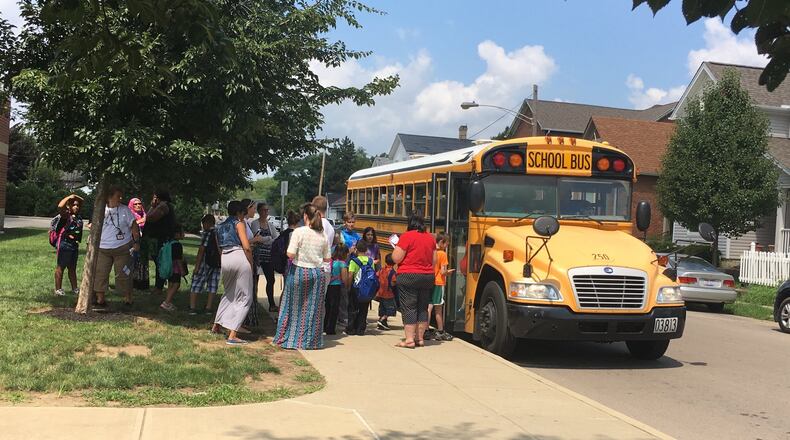* Having seventh- and eighth-graders ride RTA rather than Dayton Public Schools buses;
* Changing the start times of some schools, to a three-tier schedule, with schools starting at 7:15, 8:15 and 9:15;
* Making commercial day care centers responsible for transporting students to their location;
* Getting state approval to stop busing charter or parochial students whose routes take more than 30 minutes;
* Requiring students who attend a DPS school outside their city quadrant to transport themselves.
RELATED: Parents angry with DPS busing woes
Superintendent Rhonda Corr said some changes, such as the school start times, are already moving forward. Assistant Superintendent Shelia Burton asked for school board input on other proposals.
“If we can improve transportation, there will be improvements in so many other areas, including academics, attendance, participation in after-school activities, athletics, exposure opportunities during the course of the day, bus ride times … it’s just unlimited,” Corr said.
DPS has been battling busing problems for years, citing a lack of drivers and a complicated route system that serves its own schools as well as charter and private schools in the area. Frustrated parents have complained of missing buses, late buses and long wait times when they call for information.
Burton said the recommendations would reduce the number of students DPS has to transport, meaning they could finally have enough drivers to cover all routes, thereby improving on-time performance, and also could save millions of dollars per year.
AUDIT: Drivers use buses for personal errands
“This is great research,” school board member Adil Baguirov said. “I strongly believe that finally next year we will fix this monster of a problem called transportation.”
While looking at his colleagues, school board President Robert Walker told Corr and Burton, “I hope you hear very little resistance from the board with this. We’re looking forward to how we can be helpful with the implementation.”
The RTA/middle school switch would have to be negotiated with the Great Dayton Regional Transit Authority, and RTA Executive Director Mark Donaghy said there have already been some conversations on the topic.
DPS high school students already ride RTA buses. But because state law requires schools to provide for transportation of younger students, the district would likely spend about $1 million on bus passes for about 2,320 DPS, charter and parochial middle school students. They estimate that’s roughly $3 million less than the total cost of busing those students themselves, counting buses, staff, fuel and other costs.
RELATED: Video shows bus topple after car hits it
“In the big picture, it makes a certain amount of sense,” Donaghy said. “The challenges are, what are the origin points of the kids, what are the school locations, does RTA have service for them there? Do our schedules work with their bell times? … To the extent we have capacity, we’re happy to do it.”
Ed Wimsatt, a grandparent and owner of Price Stores downtown, said he thinks middle school is too young for students to be daily RTA riders. Tiki Kai-Krismano of Dayton, a daily RTA rider, said DPS needs to save money.
“As long as (the students) have respect for others, basically older people, it’ll work,” she said.
Burton spelled out the potential student impact and savings of each proposal — some of which would increase the burden on families or other agencies.
No longer busing charter or parochial students with 30-plus-minute routes could free up as many as eight DPS buses, but leave 160 students needing other transportation. Burton said state officials will review those routes this month.
Discontinuing transportation to 35 commercial day cares would mean 600 fewer students to drive. Burton and Corr emphasized this would not affect residential day care, such as grandparents or other family members.
Going to the three-tier schedule would allow the district to operate with 145 buses rather than 175, according to Burton, saving money, but also resulting in less scrambling to cover routes, and adding field trip and extracurricular capacity.
“Right now we’re challenged to do that,” she said. “We don’t get kids to their sporting events on time. Sometimes we’ve had to cancel the event because we cannot make it.”
- WHIO TV Reporter Kate Bartley contributed to this report.
Town hall meetings
DPS Superintendent Rhonda Corr will discuss academic offerings, transportation plans and extracurricular activities.
May 10: E.J. Brown Middle School
May 11: Wogaman Middle School
May 15: Kiser PreK-6 School
May 17: Belmont High School
All meetings 5:30 to 6:30 p.m., with light refreshments
About the Author

